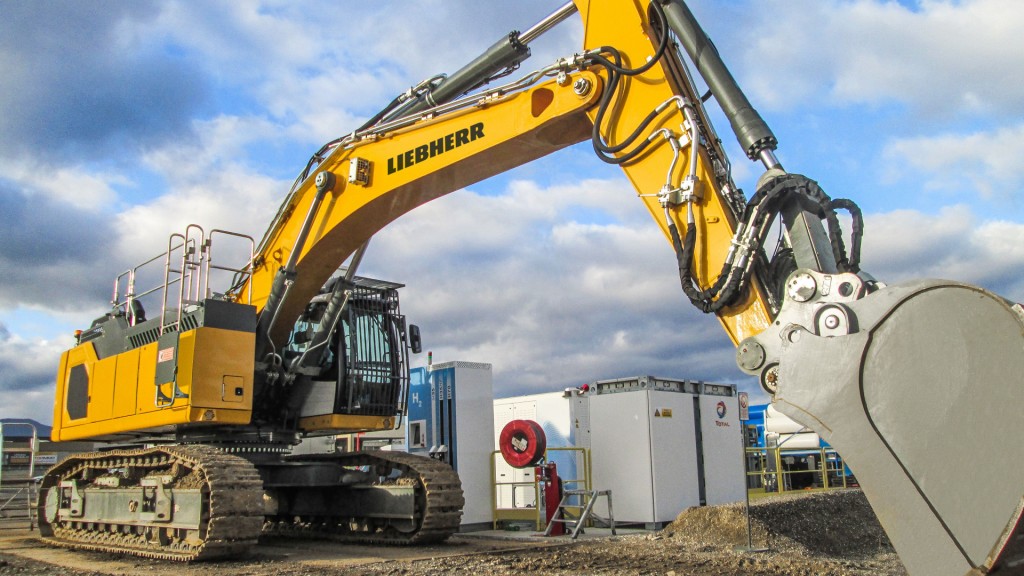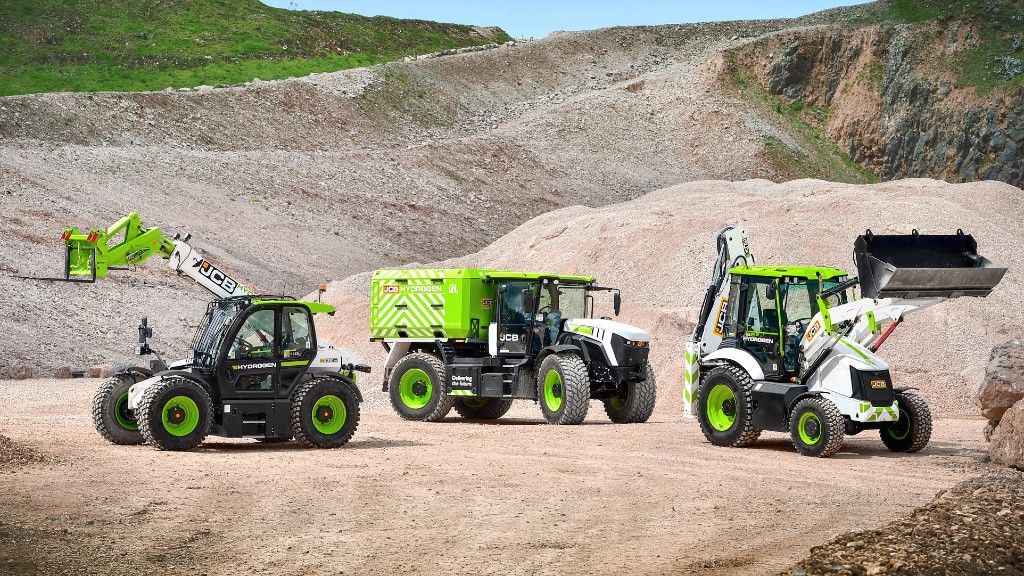
The ongoing drive for cleaner equipment operation has been taken up by major manufacturers in multiple directions. Hydrogen is one of those directions - hydrogen is a clean fuel that allows for CO2-free operations, also removes particulates and other potential pollutants, and can be used in several ways.
At bauma 2022, several manufacturers provided updates on their hydrogen explorations. While hydrogen power development remains in the early stages, these companies presented demonstration models that provide insight in the direction that hydrogen-fueled equipment may take.
Liebherr R 9XX H2 hydrogen-powered excavator
The winner of the bauma 2022 innovation award for climate protection is Liebherr's debut hydrogen-powered excavator, the R 9XX H2, presented to the public for the first time during the show. The 50-ton excavator is based on the current generation 8 crawler machines, and according to Liebherr matches the performance of its diesel partners.
At the heart of the Liebherr machine is the H966 hydrogen engine, developed by Liebherr-France for use in demonstration and field trials. It is based on an intake manifold injection technology, also known as PFI, and the results that have been received thus far are promising for the future of hydrogen engine development.
The H2 drive emits extremely low levels of NOx and CO2, according to Liebherr. Depending on the assessment method, CO2 emissions can be reduced by almost 100 percent when considering "tank to wheel" - the use of fuel inside the wheel - or 70 percent when considered across the life cycle of the machine.
The overall design of the R 9XX H2 features a unique refueling system that uses infrared communication between the excavator and the refueling station to ensure quick and safe service.
Liebherr is working on further hydrogen-based drive technologies, including direct injection, which can provide higher power density and be suitable for demanding applications like construction and mining.
Hyundai HW155H concept hydrogen-powered wheeled excavator
Hyundai has explored the concept of hydrogen fueling for some time in its automotive business, and it is now turning that knowledge to the heavy equipment sector. At bauma, Hyundai displayed its HW155H concept wheeled excavator as an example of the potential that hydrogen brings to future power technologies.
A hydrogen fuel cell is at the centre of the HW155H; Hyundai has been working on fuel cell drivelines since 2020, with a focus on forklifts as well as medium and large excavators over the coming years.
The hydrogen excavator has a fuel cell mounted in the rear of the upperstructure. Inside, the fuel cell uses a chemical reaction between stored hydrogen and the oxygen present in the air to generate electrical energy, which is then moved through an inverter to generate usable electric power. That power is then used to drive the hydraulic pump, which then powers the machine as in a normal excavator.
In the process, the only emission that's generated by the fuel cell is water. Hyundai says that when hydrogen is produced using renewable energy, the powertrain's carbon emissions become very low.
The HW155H provides power and performance with no emissions and the ability to refuel from a hydrogen station in minutes, even in remote locations.
Volvo Penta dual-fuel hydrogen engine
An evolution of Volvo Penta's D8 engine model was unveiled at bauma that uses hydrogen as a renewable fuel source, a move that the company says will reduce CO2 emissions by up to 80 percent without losing power or performance.
Operation is similar to the conventional D8 engine, but uses hydrogen instead of diesel. However, when hydrogen isn't available, it is capable of running on regular fuel to ensure continued uptime. Volvo Penta says this is one approach to future-proofing for when a reliable hydrogen fueling infrastructure is in place.
The dual-fuel system is a partnership with CMB.TECH, which trials the hydrogen add-on kit and tank system to work alongside the Volvo Penta engine and software. The current plan is to have engines in customer machines in Europe by 2023 as part of a market pilot project before small-scale production takes place.
Company info
6100 Atlantic Blvd.
Norcross, GA
US, 30071
Website:
na.hd-hyundaice.com
Phone number:
877-509-2254
1015 Sutton Drive
Burlington, ON
CA, L7L 5Z8
Website:
liebherr.com/en/can/about-liebherr/liebherr-worldwide/canada/liebherr-in-canada.html





